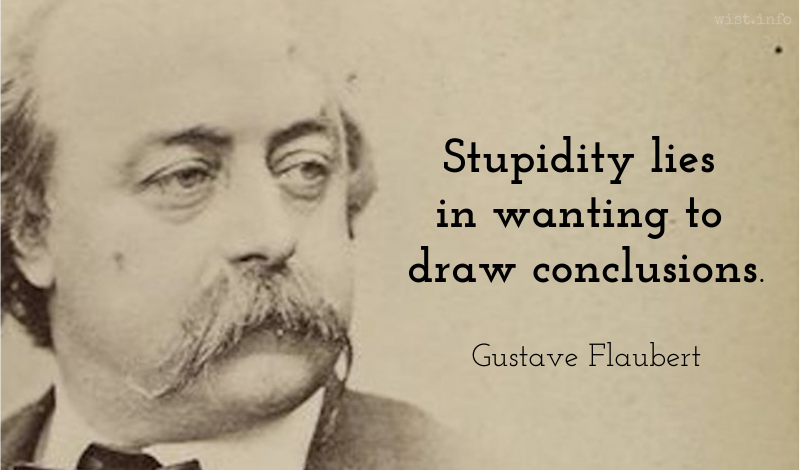Firmness in decision is often merely a form of stupidity. It indicates an inability to think the same thing out twice.
H. L. Mencken (1880-1956) American writer and journalist [Henry Lewis Mencken]
A Little Book in C Major, ch. 5, § 30 (1916)
(Source)
Variant:
FIRMNESS: A form of stupidity: proof of an inability to think the same thing out twice.
[A Book of Burlesques, "The Jazz Webster" (1924)]
Quotations about:
stupidity
Note not all quotations have been tagged, so Search may find additional quotes on this topic.
They’re talking about things of which they don’t have the slightest understanding, anyway. It’s only because of their stupidity that they’re able to be so sure of themselves.
Franz Kafka (1883-1924) Czech-Austrian Jewish writer
The Trial, ch. 1 (1925) [tr. Wyllie (2003)]
(Source)
The protagonist Josef K., musing over the minor functionaries who have arrested him on unknown charges.
I always fear less a dull man who is naturally strong
Than someone who is weak and clever.
[ἀεὶ γὰρ ἄνδρα σκαιὸν ἰσχυρὸν φύσει
ἧσσον δέδοικα τἀσθενοῦς τε καὶ σοφοῦ.]Euripides (485?-406? BC) Greek tragic dramatist
Bellerophon [Βελλεροφῶν], frag. 290 (TGF) (c. 430 BC) [tr. @sentantiq (2015)]
(Source)
Barnes frag. 51, Musgrave frag. 11. (Source (Greek)). Alternate translations:
By far less dangerous I esteem the fool
Endued with strength of body, than the man
Who's feeble and yet wise.
[tr. Wodhull (1809)]
I always fear a stupid if bodily powerful man less than one who is both weak and clever.
[tr. Collard, Hargreaves, Cropp (1995)]
Always I fear an unintelligent but naturally strong man less than a weak and clever one.
[tr. Stevens (2012)]
I fear less the powerful but stupid
than the weak and cunning.
[Source]
Of course someone would be that stupid. Some humans would do anything to see if it was possible to do it. If you put a large switch in some cave somewhere, with a sign on it saying “End-of-the-World Switch. PLEASE DO NOT TOUCH,” the paint wouldn’t even have time to dry.
The person, be it gentleman or lady, who has not pleasure in a good novel must be intolerably stupid.
For what is there more hideous than avarice, more brutal than lust, more contemptible than cowardice, more base than stupidity and folly? Well, then, are we to call those persons unhappy, who are conspicuous for one or more of these, on account of some injuries, or disgraces, or sufferings to which they are exposed, or on account of the moral baseness of their sins?
[Quid enim foedius auaritia, quid immanius libidine, quid contemptius timiditate, quid abiectius tarditate et stultitia dici potest? Quid ergo? Eos qui singulis uitiis excellunt aut etiam pluribus, propter damna aut detrimenta aut cruciatus aliquos miseros esse dicimus, an propter uim turpitudinemque uitiorum?]
Marcus Tullius Cicero (106-43 BC) Roman orator, statesman, philosopher
De Legibus [On the Laws], Book 1, ch. 19 / sec. 51 (1.19/1.51) [Marcus] (c. 51 BC) [tr. Barham/Yonge (1878)]
(Source)
(Source (Latin)). Alternate translations:
For what is there more hideous than avarice, more ferocious than lust, more contemptible than cowardice, more base than stupidity and folly? Well, therefore, may we style unhappy, those persons in whom any one of these vices is conspicuous, not on account of the disgraces or losses to which they are exposed, but on account of the moral baseness of their sins.
[tr. Barham (1842)]
For what can be thought of that is more loathsome than greed, what more inhuman than lust, what more contemptible than cowardice, what more degraded than stupidity and folly? Well, then, shall we say that those who are sunk deepest in a single vice, or in several, are wretched on account of any penalties or losses or tortures which they incur, or on account of the base nature of the vices themselves?
[tr. Keyes (1928)]
What can be called more revolting than greed, more bestial than lust, more despicable than cowardice, more abject than dullness and stupidity? What then? Take those people who are conspicuous for one (or more than one) vice. Do we call them wretched because of the losses or damages or pain they suffer, or because of the power and ugliness of their vices?
[tr. Rudd (1998)]
What is uglier than greed, what is more horrible than lust, what is more contemptible than cowardice, what is lower than sloth and stupidity? What then? People who are remarkable for single vices or even for several -- do we call them wretched because of material losses or torture, or because of the great dishonor from the vices themselves?
[tr. Zetzel (1999)]
What could be called fouler than avarice, what more monstrous than lust, what more scorned than cowardice, what more despicable than dullness and foolishness? What then? Do we say about those who are conspicuous for their individual vices, or even many vices, that they are wretched because of losses or damages or tortures, or because of the significance and the disgrace of their vices?
[tr. Fott (2013)]
Politeness is prudence and consequently rudeness is folly. To make enemies by being wantonly and unnecessarily rude is as crazy as setting one’s house on fire.
[Höflichkeit ist Klugheit; folglich ist Unhöflichkeit Dummheit: sich mittelst ihrer unnötiger und mutwilliger Weise Feinde machen ist Raserei, wie wenn man sein Haus in Brand steckt.]
Arthur Schopenhauer (1788-1860) German philosopher
Parerga and Paralipomena, Vol. 1, “Aphorisms on the Wisdom of Life [Aphorismen zur Lebensweisheit],” ch. 5 “Counsels and Maxims [Paränesen und Maximen],” § 3.36 (1851) [tr. Payne (1974)]
(Source)
Source (German). Alternate translation:
It is a wise thing to be polite; consequently, it is a stupid thing to be rude. To make enemies by unnecessary and willful incivility, is just as insane a proceeding as to set your house on fire.
[tr. Saunders (1890)]
There were grammatical errors even in his silence.
[Nawet w jego milczeniu były błędy językowe.]
Stanislaw Lec (1909-1966) Polish aphorist, poet, satirist
Unkempt Thoughts [Myśli nieuczesane] (1957) [tr. Gałązka (1962)]
(Source)
Alternate translation: "Even in his silence were grammatical errors."
Sometimes it’s a good thing to scare people. Sometimes fear is all that will keep them from doing stupid things.
Freedom only means the freedom to be stupid. Because you don’t need freedom to do what everybody thinks you should.
Penn Jillette (b. 1955) American stage magician, actor, musician, author
“Honest Questions with Penn Jillette,” Interview by Glen Beck, CNN (2 Nov 2007)
(Source)
This is an example of what those who have studied history well know: When stupidity is considered patriotism, it is unsafe to be intelligent.
The supreme crime of the church to-day is that everywhere and in all its operations and influences it is on the side of sloth of mind; that it banishes brains, it sanctifies stupidity, it canonizes incompetence.
Upton Sinclair (1878-1968) American writer, journalist, activist, politician
The Profits of Religion, Book Two: “The Church of Good Society,” “The Canonization of Incompetence” (1917)
(Source)
I have no time to scold, and I learned thirty years ago it was foolish to scold. I have enough trouble overcoming my own limitations without fretting over the fact God has not seen fit to distribute evenly the gift of intelligence.
John Wanamaker (1838-1922) American merchant, marketer, philanthropist, Postmaster General
Quoted in Herbert Adams Gibbons, John Wanamaker, Vol. 2 (1926)
(Source)
Variant paraphrase: "It's foolish to scold people. I have enough trouble overcoming my own limitations without fretting over the fact that God didn't see fit to distribute brains equally."
Many journalists have fallen for the conspiracy theory of government. I do assure you that they would produce more accurate work if they adhered to the cock-up theory.
Bernard Ingham (b. 1932) British journalist, civil servant, press secretary
Quoted in The Observer (17 Mar 1985)
Often paraphrased, "Cock-up before conspiracy." Cf. Hanlon.
Stupidity lies in wanting to draw conclusions.
[L’ineptie consiste à vouloir conclure. […] Oui, la bêtise consiste à vouloir conclure.]
Gustave Flaubert (1821-1880) French writer, novelist
Letter to Louis Bouilhet (4 Sep 1850)
(Source)
The phrase is used twice in the letter. The initial phrase is usually translated to "foolishness" or "folly," the second to "stupidity."
Some people idealize force and pull it into the foreground and worship it, instead of keeping it in the background as long as possible. I think they make a mistake, and I think that their opposites, the mystics, err even more when they declare that force does not exist. I believe that it exists, and that one of our jobs is to prevent it from getting out of its box. It gets out sooner or later, and then it destroys us and all the lovely things which we have made. But it is not out all the time, for the fortunate reason that the strong are so stupid.
If you attack Stupidity, you attack an entrenched interest with friends in government and every walk of public life, and you will make small progress against it.
Robertson Davies (1913-1995) Canadian author, editor, publisher
The Table Talk of Samuel Marchbanks (1949)
(Source)
It is safe to wager that every public idea and every accepted convention is sheer foolishness, because it has suited the majority.
[Il y a à parier que toute idée publique, toute convention reçue, est une sottise, car elle a convenu au plus grand nombre.]
Nicolas Chamfort (1741-1794) French writer, epigrammist (b. Nicolas-Sébastien Roch)
Products of Perfected Civilization [Produits de la Civilisation Perfectionée], Part 1 “Maxims and Thoughts [Maximes et Pensées],” ch. 2, ¶ 130 (1795) [tr. Mathers (1926)]
(Source)
(Source (French)). Alternate translations:
It may be argued that every public idea, every accepted convention, is a piece of stupidity, for has it not commended itself to the greatest number?
[tr. Hutchinson (1902), "The Cynic's Breviary"]
One can be certain that every generally held idea, every received notion, will be an idiocy, because it has been able to appeal to a majority.
[In Botton, Status Anxiety (2004)]
It is likely that every public idea, every received convention, is folly, because the majority of men consented to it.
[Source]
That sort of thing wears thin — for when one’s cynicism becomes perfect and absolute, there’s no longer anything amusing in the stupidity and hypocrisy of the herd. It is all to be expected — what else could human nature produce? — so irony annuls itself by means of its own victories!
Yet at this very point it becomes quite clear that only an act of liberation, not instruction, can overcome stupidity. Here we must come to terms with the fact that in most cases a genuine internal liberation becomes possible only when external liberation has preceded it. Until then we must abandon all attempts to convince the stupid person. This state of affairs explains why in such circumstances our attempts to know what “the people” really think are in vain and why, under these circumstances, this question is so irrelevant for the person who is thinking and acting responsibly.
Dietrich Bonhoeffer (1906-1945) German Lutheran pastor, theologian, martyr
“On Stupidity” (1942)
(Source)
The fact that the stupid person is often stubborn must not blind us to the fact that he is not independent. In conversation with him, one virtually feels that one is dealing not at all with him as a person, but with slogans, catchwords, and the like that have taken possession of him. He is under a spell, blinded, misused, and abused in his very being. Having thus become a mindless tool, the stupid person will also be capable of any evil and at the same time incapable of seeing that it is evil. This is where the danger of diabolical misuse lurks, for it is this that can once and for all destroy human beings.
Dietrich Bonhoeffer (1906-1945) German Lutheran pastor, theologian, martyr
“On Stupidity” (1942)
(Source)
Stupidity is a more dangerous enemy of the good than malice. One may protest against evil; it can be exposed and, if need be, prevented by use of force. Evil always carries within itself the germ of its own subversion in that it leaves behind in human beings at least a sense of unease. Against stupidity we are defenseless. Neither protests nor the use of force accomplish anything here; reasons fall on deaf ears; facts that contradict one’s prejudgment simply need not be believed — in such moments the stupid person even becomes critical — and when facts are irrefutable they are just pushed aside as inconsequential, as incidental. In all this the stupid person, in contrast to the malicious one, is utterly self-satisfied and, being easily irritated, becomes dangerous by going on the attack. For that reason, greater caution is called for when dealing with a stupid person than with a malicious one. Never again will we try to persuade the stupid person with reasons, for it is senseless and dangerous.
Dietrich Bonhoeffer (1906-1945) German Lutheran pastor, theologian, martyr
“On Stupidity” (1942)
(Source)
Some of you are really smart. You know who you are.
Some of you are really thick. Unfortunately, you don’t know who you are.
“Violence,” came the retort, “is the last refuge of the incompetent.”
Isaac Asimov (1920-1992) Russian-American author, polymath, biochemist
“Bridle and Saddle,” Astounding (Jun 1942)
Retitled "The Mayors" in Foundation (1951). The phrase appears multiple times in the story. See Johnson.
It is the dull man who is always sure, and the sure man who is always dull.
H. L. Mencken (1880-1956) American writer and journalist [Henry Lewis Mencken]
“The National Letters,” Prejudices: Second Series (1920)
(Source)
Stupidity is the same as evil if you judge by the results.
Margaret Atwood (b. 1939) Canadian writer, literary critic, environmental activist
Surfacing, ch. 3 (1972)
(Source)
It is so pleasant to come across people more stupid than ourselves. We love them at once for being so.
Jerome K. Jerome (1859-1927) English writer, humorist [Jerome Klapka Jerome]
“On Cats and Dogs,” The Idle Thoughts of an Idle Fellow (1889)
(Source)
A weak mind does not accumulate force enough to hurt itself; stupidity often saves a man from going mad.
If you leap into a Well, Providence is not bound to fetch you out.
Thomas Fuller (1654-1734) English physician, preacher, aphorist, writer
Gnomologia: Adages and Proverbs, #2795 (1732)
(Source)
With Stupidity and sound Digestion man may front much.
Thomas Carlyle (1795-1881) Scottish essayist and historian
Sartor Resartus, Book 2, ch. 7 (1831)
(Source)
When a war breaks out, people say: “It’s too stupid; it can’t last long.” But though the war may well be “too stupid,” that doesn’t prevent its lasting. Stupidity has a knack of getting its way; as we should see if we were not always so much wrapped up in ourselves.
Evil isn’t the real threat to the world. Stupid is just as destructive as Evil, maybe more so, and it’s a hell of a lot more common. What we really need is a crusade against Stupid. That might actually make a difference.
Jim Butcher (b. 1971) American author
(Attributed)
Often cited to the short story "Vignette" (also known as "Publicity and Advertising"), but not found there.
For at least two thirds of our miseries spring from human stupidity, human malice, and those great motivators and justifiers of malice and stupidity, idealism, dogmatism, and proselytizing zeal on behalf of religious or political idols.
Aldous Huxley (1894-1963) English novelist, essayist and critic
“Knowledge and Understanding,” Vedanta and the West (May-Jun 1956)
(Source)
Revision of a 1955 lecture given at the Vedanta Society of Southern California; this phrase, however, does not occur in it (the surrounding text is found around the 10:00 mark). Reprinted in Adonis and the Alphabet, and Other Essays (in the US Tomorrow and Tomorrow and Tomorrow, and Other Essays) (1956).
Nothing in all the world is more dangerous than sincere ignorance and conscientious stupidity.
Martin Luther King, Jr. (1929-1968) American clergyman, civil rights leader, social activist, preacher
Strength to Love, ch. 4 “Love in Action,” sec 3 (1963)
(Source)
And I have again observed, my dear friend, in this trifling affair, that misunderstandings and neglect occasion more mischief in the world than even malice and wickedness. At all events, the two latter are of less frequent occurrence.
[Und ich habe, mein Lieber, wieder bei diesem kleinen Geschäft gefunden, dass Missverständnisse und Trägheit vielleicht mehr Irrungen in der Welt machen als List und Bosheit. Wenigstens sind die beiden letzteren gewiss seltener.]
Johann Wolfgang von Goethe (1749-1832) German poet, statesman, scientist
Die Leiden des jungen Werthers [The Sorrows of Young Werther], “Letter from May 4th” (1774)
Alt. trans.: "Misunderstandings and neglect create more confusion in this world than trickery and malice. At any rate, the last two are certainly much less frequent."
Against stupidity the very gods
Themselves contend in vain.[Mit der Dummheit kämpfen Götter selbst vergebens]
Friedrich Schiller (1759-1805) German poet, playwright, critic [Johann Christoph Friedrich von Schiller]
The Maid of Orleans [Die Jungfrau von Orleans], Act III, sc. vi (1801) [tr. Swanwick]
Alt. trans:
- "Against stupidity the gods themselves contend in vain."
- "Against stupidity the gods themselves labor in vain."
- "Against stupidity the gods themselves fight unvictorious."
- "Against stupidity even the gods contend in vain."
- "With stupidity the gods themselves contend in vain."
- "With stupidity the gods themselves struggle in vain."
For the American people are a very generous people and will forgive almost any weakness, with the possible exception of stupidity.





















































